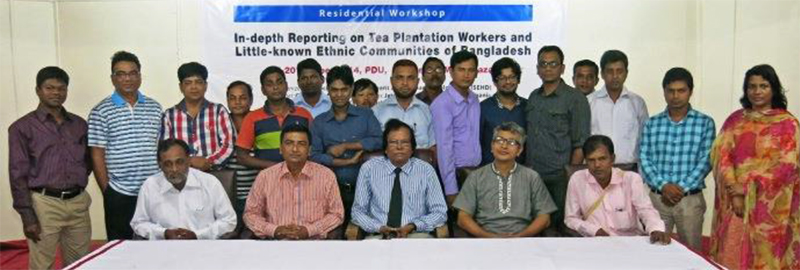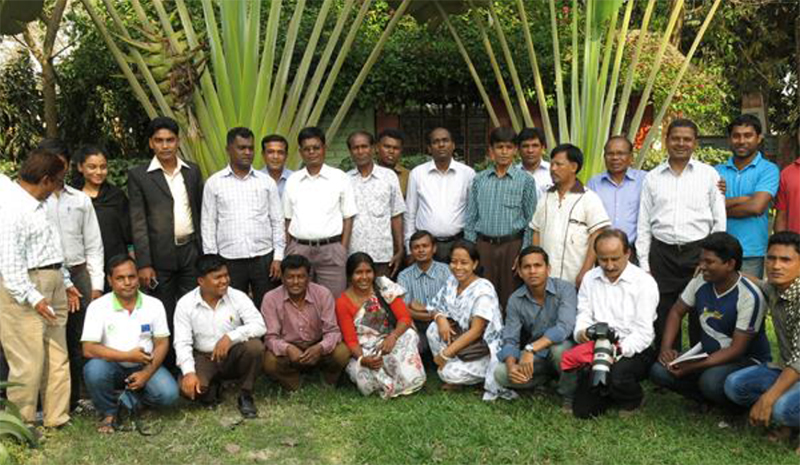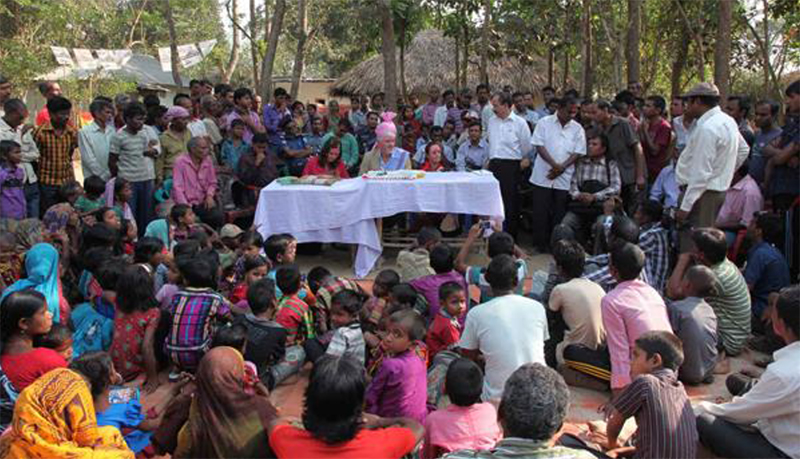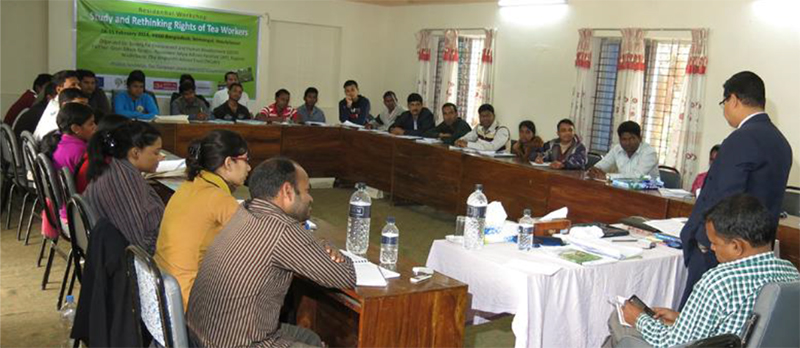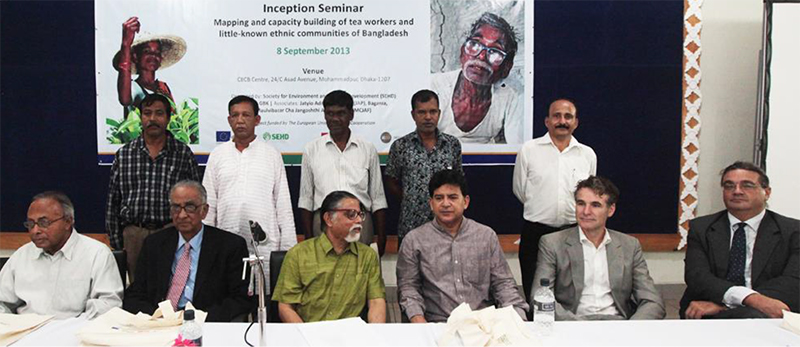Kairi also pointed out that legal remedy to tea workers deprivations have tactfully been kept away from them. “A worker has to go to the labour court located in Chittagong in case of a legal fight, which is nearly impossible for a low-paid labour,” he said. “Neither political leaders nor the state cares about the systematic deprivation of tea workers. It is very shameful that the government is not holding elections for such a big trade union as tea workers’,” deplored Kairi. Other labour leaders including Parimal Sing Baraik also reiterated the call to end tea workers’ ordeals.
While the labour law is discriminatory in the case of the tea workers, the owners ignore their legally binding essential obligation. To illustrate owners’ neglect Delwar Hossain, labour inspector (general) Sylhet Division said, “What we find in the tea garden is that the owners do not issue appointment letter to the workers. This is violation of law and we are now asking the management to issue proper appointment letter.”
The management response with regard to issuing of appointment letter to the workers is that they would raise the matter at the upper level. “We have taken some measures (cases) in this regard. We have fined three managers so far,” informed the labour inspector who also makes it a point that according to law, a worker shall be made permanent within six months of his/her appointment. But in the case of tea workers they are not made permanent within the period.
The participants, government officials, tea community leaders, researchers and tea garden officials shared their insights and opinions in the program based on their engagement with tea communities and the tea industry.
Beside sharing information with others and learning from avid researchers, participants received hands-on experience in conducting focus group discussion (FGD), face-to-face interview, and writing case studies in the unique training. Each of them was grouped with a small team that visited a couple of labour lines in five tea gardens. Every team conducted a FGD with Panchayet (an elected body of representatives of tea workers to look after various issues of a labour line) members and filled in a questionnaire that was designed to collect data on socio-economic status and ethnic composition of tea communities. Each participant also interviewed at least one tea worker and wrote case studies on issues ranging from health to education, livelihood to landlessness.
Mohammad Giashuddin, deputy director of labour (DDL) of Department of Labour, while describing the structure and functions of the departments of the Ministry of Labour and Employment, put forward some of his observations on the rights of tea workers. He said that the labour law ensures many rights to the tea workers, but those are not implemented. The workers lead a very hard life. Scarcity of clean drinking water, insufficient sanitation and housing etc characterize the labour lines.
“The tendency to deprive the tea workers is a legacy of British companies that brought the workers in promising good fortune, but deceived them,” opined Giashuddin who partially blamed the deprivation of workers on garden authority. “Tea garden managers earn a good sum of money in many ways, but they do not know laws,” he observed. However, he held the labour leaders’ failures to press their demands ultimately responsible for the labours’ deprivations. “There are hardly any cases filed against the owners,” he said.
The session at this point became vibrant as a participant threw a question to DDL, “While the elected representatives of tea workers union are driven out of labour house [the trade union office], and the government has kept the house under lock and key, where will the workers go to claim their rights?” It can be mentioned here that the first ever trade union elections for the tea workers took place in 2008. But in 2009 the elected trade union officials were removed from office by force and a government-backed ad-hoc committee was installed in their place. Later in the face of a spontaneous country-wide strike of tea workers, Awami League government emptied the house and promised fresh elections. That election is yet to be held.
In response to such query DDL confessed his limitations as a government official and said that he would hold elections if directed by the government.
Prakash Kanti Chowdhury, ADC (revenue), Moulvibazar said that the condition of tea workers and their community is improving. At least 40 schools have been established in the tea gardens in Moulvibazar district since 2010. Not all the gardens have satisfactory health, education and housing facilities, but the government is monitoring these issues. “There was a time when we (administrative officials) hardly met any garden manager, but now as they have to come to us for renewal of lease deeds, we have a chance to look into the facilities they provide for workers,” said the ADC. “In the proposed tea policy 2012, we have recommended that the tea garden authority provides a spacious house with at least two rooms and a veranda as well as sufficient health, sanitation and education facilities,” he added.
In answer to a query from a participant whether the government ever had a policy discussion over giving tea workers legal rights and ownership on the land they are living in for more than one and half century, Mr. Chowdhury said that a inter-ministerial body comprising the ministry of land, ministry of labour and other line ministries will need to sit together to decide on that.
Reacting to such question, Robiul Hasan, Manager, Kalindi tea garden feared that if tea workers are given ownership to land, they will stop working for the tea industry. He claimed that tea community is doing much better than earlier times. “Soon there will be time when no illiterate person will be left in tea gardens,” asserted Hasan.
Md. Haroon-Or-Rashid Sarker, director, Project Development Unit (PDU), Bangladesh Tea Board said that per kilogram tea is sold at more than 300 Takas while production cost is maximum 100 Takas. He opined that if the owners of tea gardens spend more from this huge profit for the workers, it will benefit the industry itself in the end. “The ration provided to the workers is of inferior quality. If the workers are sick all the time, it hampers production. These problems can be solved easily,” Rashid said.
The training ended on 11 February with participants going back to their communities with confidence and profound enthusiasm to continue writing and reporting various issues of tea communities.
The training workshop designed to share tools for rethinking rights, justice, developing minds among the tea workers in particular was moderated by Philip Gain. To prepare the participants for hands on training Dr. Tanzimuddin Khan, associate professor of Dhaka University, this writer and Philip Gain talked on Focus Group Discussion (FGD), case studies, survey, and applied research techniques.
The training ended on 11 February with participants going back to their communities with confidence and profound enthusiasm to continue writing and reporting various issues of tea communities.
PDF version of report [ Download ]
Writer is Research and Documentation Officer at Society for Environment and Human Development (SEHD).
Report by Md. Ashraful Haque
First Published: Dhaka Courier, 20 February 2014
